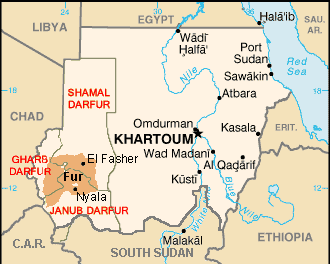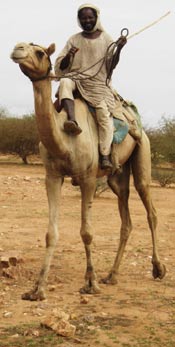 |
Fur (people)
The Fur (Fur: ''fòòrà'', Arabic: فور ''Fūr'') are an ethnic group predominantly inhabiting western Sudan. They are concentrated in the Darfur region, where they are the largest ethnic group.Gettleman, Jeffrey, "Chaos in Darfur on rise as Arabs fight with Arabs", news article, ''The New York Times'', September 3, 2007, pp 1, A7 They speak the Fur language, which belongs to the Nilo-Saharan family. Overview The Fur are the largest ethnic group in the Darfur region of western Sudan. They are also sometimes referred to by the names Fora, Fordunga, Furawi, Konjara, or Kungara. They are an active agricultural people and may also herd cattle. Some Fur families who have accumulated a substantial cattle herd developed a more nomadic lifestyle like that of their herding neighbors, the Baqqara (Baggara) Arabs. Culturally, those cattle-herding Fur are now considered to be Baqqara. The Fur are nominally Sunni Muslims following the Maliki school of Islamic law. They are a Wes ... [...More Info...] [...Related Items...] OR: [Wikipedia] [Google] [Baidu] |
|
Sudan
Sudan ( or ; ar, السودان, as-Sūdān, officially the Republic of the Sudan ( ar, جمهورية السودان, link=no, Jumhūriyyat as-Sūdān), is a country in Northeast Africa. It shares borders with the Central African Republic to the southwest, Chad to the west, Egypt to the north, Eritrea to the northeast, Ethiopia to the southeast, Libya to the northwest, South Sudan to the south and the Red Sea. It has a population of 45.70 million people as of 2022 and occupies 1,886,068 square kilometres (728,215 square miles), making it Africa's List of African countries by area, third-largest country by area, and the third-largest by area in the Arab League. It was the largest country by area in Africa and the Arab League until the 2011 South Sudanese independence referendum, secession of South Sudan in 2011, since which both titles have been held by Algeria. Its Capital city, capital is Khartoum and its most populated city is Omdurman (part of the metropolitan area of Khar ... [...More Info...] [...Related Items...] OR: [Wikipedia] [Google] [Baidu] |
|
 |
Millet
Millets () are a highly varied group of small-seeded grasses, widely grown around the world as cereal crops or grains for fodder and human food. Most species generally referred to as millets belong to the tribe Paniceae, but some millets also belong to various other taxa. Millets are important crops in the semiarid tropics of Asia and Africa (especially in India, Mali, Nigeria, and Niger), with 97% of millet production in developing countries. This crop is favored due to its productivity and short growing season under dry, high-temperature conditions. Millets are indigenous to many parts of the world. The most widely grown millets are sorghum and pearl millets, which are important crops in India and parts of Africa. Finger millet, proso millet, and foxtail millet are also important crop species. Millets may have been consumed by humans for about 7,000 years and potentially had "a pivotal role in the rise of multi-crop agriculture and settled farming societies." ... [...More Info...] [...Related Items...] OR: [Wikipedia] [Google] [Baidu] |
 |
Darfur Conflict
The War in Darfur, also nicknamed the Land Cruiser War, is a major armed conflict in the Darfur region of Sudan that began in February 2003 when the Sudan Liberation Movement/Army, Sudan Liberation Movement (SLM) and the Justice and Equality Movement (JEM) rebel groups began fighting against the government of Sudan, which they accused of oppressing Darfur's non-Arab population. The government responded to attacks by carrying out a campaign of ethnic cleansing against Darfur's non-Arabs. This resulted in the death of hundreds of thousands of civilians and the indictment of Sudan's president, Omar al-Bashir, for Darfur genocide, genocide, war crimes, and crimes against humanity by the International Criminal Court. One side of the conflict is mainly composed of the Sudanese military, police and the Janjaweed, a Sudanese militia group whose members are mostly recruited among Arabization, Arabized indigenous Africans and a small number of Bedouin of the northern Rizeigat; the major ... [...More Info...] [...Related Items...] OR: [Wikipedia] [Google] [Baidu] |
 |
Refugees
A refugee, conventionally speaking, is a displaced person who has crossed national borders and who cannot or is unwilling to return home due to well-founded fear of persecution.FAQ: Who is a refugee? ''www.unhcr.org'', accessed 22 June 2021 Such a person may be called an asylum seeker until granted refugee status by the contracting state or the United Nations High Commissioner for Refugees (UNH ... [...More Info...] [...Related Items...] OR: [Wikipedia] [Google] [Baidu] |
 |
Jebel Marra
The Marrah Mountains or Marra Mountains (Fur, Fugo Marra; ar, جبل مرة, Jebel Marra are a range of volcanic peaks in a massif that rises up to . They are the highest mountains in Sudan. Geography The mountains are located in the center of the Darfur region of Sudan on the border of the states of South Darfur and Central Darfur, with a smaller part of the range in the state of North Darfur. The highest point is Deriba Caldera. The upper reaches of the massif is a small area of temperate climate with high rainfall and permanent springs of water amidst the dry savanna and scrub of the Sahel below. Apart from the Aïr Mountains in Niger which are on the border of the Sahara proper, the Marrah Mountains are the only major mountain range in the otherwise flat Sahel, rising up to above the plain, but are relatively unknown owing to lack of development and political conflict in the region. The last eruption occurred around 1500 BC. The centre of activity was Deriba Caldera, ... [...More Info...] [...Related Items...] OR: [Wikipedia] [Google] [Baidu] |
|
Jebel Sî
Jabal, Jabel, Jebel or Jibal may refer to: People * Jabal (name), a male Arabic given name * Jabal (Bible), mentioned in the Hebrew Bible Places In Arabic, ''jabal'' or ''jebel'' (spelling variants of the same word) means 'mountain'. * Dzhebel, a town in Bulgaria * Jabal Amman, part of Amman, Jordan * Jabel, a German municipality * Jabal, Amreli, a village in Gujarat, India * Jabal Rural District, in Iran * Jebel, Timiș, a commune in Timiș County, Romania * Jebel, Turkmenistan, a town * Jibal or al-Jabal, a late 1st-millennium-CE West-Asian realm Other uses * Djebel : ''For mountains or other uses, see: Jabal.'' Djebel (1937–1958) was a French Thoroughbred racehorse, who won 15 of 22 races during 1939–1942 including the Prix d'Essai, 2000 Guineas and Prix de l'Arc de Triomphe. He was later a leading ... (1937–1958), a racehorse See also * * * * * * Jubal (other) {{disambiguation ... [...More Info...] [...Related Items...] OR: [Wikipedia] [Google] [Baidu] |
|
|
Sudan Liberation Movement
The Sudan Liberation Movement/Army ( ar, حركة تحرير السودان ''Ḥarakat Taḥrīr Al-Sūdān''; abbreviated SLM, SLA, or SLM/A) is a Sudanese rebel group active in Darfur, Sudan. It was founded as the Darfur Liberation FrontFlint, Julie and De Waal, Alexander (2008) ''Darfur: A New History of a Long War'' Zed Books, London, p. 90, by members of three indigenous ethnic groups in Darfur: the Fur, the Zaghawa, and the Masalit, among whom were the leaders Abdul Wahid al Nur of the Fur and Minni Minnawi of the Zaghawa. Formation General Omar al-Bashir and the National Islamic Front headed by Dr. Hassan al-Turabi overthrew the Sudanese government led by Ahmed al-Mirghani in 1989. A large section of the population in Darfur, particularly the non-Arab ethnicities in the region, became increasingly marginalized. These feelings were crystallized by the publication in 2000 of ''The Black Book'', which detailed the structural inequity in the Sudan that denies non-Ar ... [...More Info...] [...Related Items...] OR: [Wikipedia] [Google] [Baidu] |
|
|
Abdul Wahid Al Nur
Abdul Wahid Mohamed al Nur (also Abdel Wahid el-Nur or Abdulwahid Mohammed Nour; ar, عبد الواحد محمد نور, ''ʿAbd al-Wāḥid Muḥammad Nūr''; born in 1968) is the leader of the rebel Sudan Liberation Movement (al Nur) faction. Born in Zalingei, West Darfur, he was educated at the University of Khartoum, where he graduated in 1995 with a law degree before working as a lawyer.Sudan rebel leader on limelight while President in panic ''Sudan Tribune'', 18 July 2008 In June 1992, al Nur and others at the University of Khartoum created the Sudan Liberation Movement to liberate Sudan from Islamic National Front. Life Abdul Wahid Mohamed al Nur is a lawyer, born in 1968 in[...More Info...] [...Related Items...] OR: [Wikipedia] [Google] [Baidu] |
|
 |
History Of Darfur
Throughout its history, Darfur has been the home to several cultures and kingdoms, like the mythical Tora or the Daju and Tunjur kingdoms. The recorded history of Darfur begins in the seventeenth century, with the foundation of the Fur Sultanate by the Keira dynasty. In 1875, the Anglo-Egyptian Co-dominion in Khartoum ended the dynasty. The British allowed Darfur a measure of autonomy until formal annexation in 1916. However, the region remained underdeveloped through the period of colonial rule and after independence in 1956. The majority of national resources were directed toward the riverine Arabs clustered along the Nile near Khartoum. This pattern of structural inequality and overly underdevelopment resulted in increasing restiveness among Darfuris. The influence of regional geopolitics and war by proxy, coupled with economic hardship and environmental degradation, from soon after independence led to sporadic armed resistance from the mid-1980s. The continued violence cul ... [...More Info...] [...Related Items...] OR: [Wikipedia] [Google] [Baidu] |
 |
Sultanate Of Darfur
The Sultanate of Darfur was a pre-colonial state in present-day Sudan. It existed from 1603 to October 24, 1874, when it fell to the Sudanese warlord Rabih az-Zubayr and again from 1898 to 1916, when it was conquered by the British and integrated into Anglo-Egyptian Sudan. At its peak in the late 18th and early 19th century it stretched all the way from Darfur in the west to Kordofan and the western banks of the White Nile in the east, giving it the size of present-day Nigeria. History Origins Darfur is composed mostly of semi-arid plains that cannot support a dense population. The one exception is the area in and around the Jebal Marra mountains. It was from bases in these mountains that a series of groups expanded to control the region. The Daju and the 14th century migrants the Tunjur were the earliest powers in Darfur according to written records. The transition of power from the Daju to the Tunjur was facilitated through marriage. Eventually the Tunjur began mar ... [...More Info...] [...Related Items...] OR: [Wikipedia] [Google] [Baidu] |